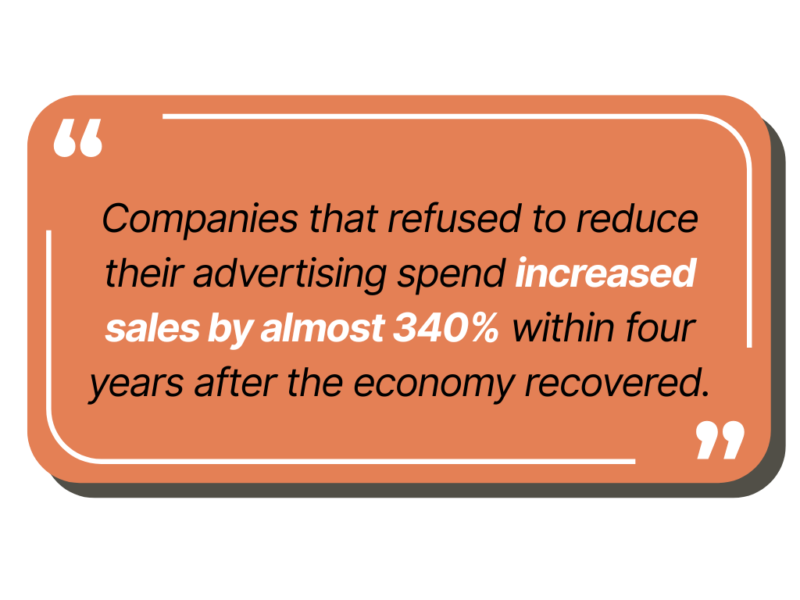Why Digital Marketing in a Recession is Crucial: And How to Do It
Description
In times of economic uncertainty, businesses face difficult decisions about where to cut costs. According to the World Economic Forum, marketing budgets are often the first casualty when recession looms, with 91% of U.S. economists now expecting weak economic growth and 63% anticipating a potential global recession. However, historical data consistently shows that maintaining—or even increasing—marketing spend during downturns is one of a business’s smartest moves. Digital marketing, in particular, offers unique advantages that make it not just a survival tactic during a recession, but a strategic opportunity to gain market share and position your business for accelerated growth when the economy recovers.
Key Highlights
- Competitive Edge: Companies that maintained marketing during past recessions saw up to 340% sales growth in the recovery period
- Budget Optimization: Digital channels offer precise measurement and higher ROI than traditional marketing during economic uncertainty
- Consumer Behavior Shift: Recession drives increased online research before purchases, making digital presence more critical
- Strategic Positioning: When competitors cut marketing budgets, maintaining visibility creates market share opportunities
- Long-term Investment: Digital marketing during downturns builds brand resilience that pays dividends during economic recovery
TABLE OF CONTENTS:
- The Historical Evidence: Marketing During Past Recessions
- Why Digital Marketing Specifically Matters in a Recession
- The Psychological Impact: What Your Marketing Says About Your Brand
- Digital Marketing Strategies That Thrive During Recessions
- Budget Optimization Tactics for Recession Marketing
- Content and Messaging Adjustments for Recession Audiences
- Customer Retention: The Recession Marketing Priority
- Measuring Success: KPIs for Recession Marketing
- Implementation Timeline: A Phased Approach
- Looking Forward: Positioning for the Recovery
The Historical Evidence: Marketing During Past Recessions
The knee-jerk reaction for many businesses during economic downturns is to slash marketing budgets. However, research consistently demonstrates that this approach often backfires. According to a comprehensive literature review of research about marketing during recessions, companies that increased advertising during economic downturns experienced higher sales, market share, and earnings both during and after the recession.
Perhaps the most compelling statistic comes from a study of the 1981-82 recession, which found that companies that refused to reduce their advertising spend increased sales by almost 340% within four years after the economy recovered. This dramatic difference in performance wasn’t just a short-term gain—it represented a fundamental shift in market position that persisted long after economic conditions normalized.

More recently, during the COVID-19 pandemic, brands that maintained visibility and adapted their messaging appropriately saw significant benefits. A survey revealed that 65% of customers cared about a brand’s activities during the crisis, with those perceptions influencing purchasing decisions well beyond the immediate situation.
This pattern repeats across multiple economic downturns: companies that view marketing as an investment rather than an expense emerge stronger, while those that retreat to save costs often struggle to regain momentum when conditions improve.
Why Digital Marketing Specifically Matters in a Recession
While all forms of marketing can be valuable during a recession, digital marketing offers distinct advantages that make it particularly effective during economic uncertainty:
Cost-Effectiveness and Measurability
“Digital marketing channels often provide a more cost-effective approach compared to traditional marketing methods,” explains Chad Bittle, an Email Marketing Manager at Thrive Agency. “With tighter budgets during a recession, investing in digital marketing allows businesses to reach their target audience without breaking the bank.”
Unlike traditional advertising, digital marketing provides precise measurement of performance, allowing marketers to track and maximize conversion opportunities. This data-driven approach enables businesses to make informed decisions about where to allocate limited resources, ensuring every marketing dollar works as hard as possible.
Flexibility and Adaptability
Economic downturns often require quick pivots in messaging and strategy. Digital channels allow for rapid adjustments without the lead times and sunk costs associated with traditional media. As consumer priorities shift during a recession, digital marketers can test new approaches, monitor results in real-time, and refine their tactics accordingly.
This adaptability is crucial when navigating uncertain economic waters. A message that resonated before the recession may fall flat or even appear tone-deaf during challenging times. Digital platforms enable marketers to stay attuned to changing consumer sentiment and adjust accordingly.
Changing Consumer Behavior
Recessions fundamentally alter how consumers make purchasing decisions. People spend more time researching options, comparing prices, and seeking reassurance before committing to purchases. This increased deliberation makes a strong digital presence more important than ever.
“During a recession, it’s essential to acknowledge the challenging times and show empathy towards customers,” Bittle advises. “Address their pain points, offer support, and provide value. This can help build trust and strengthen the customer-business relationship.”
With consumers spending more selectively, being visible and accessible online—where most of this research happens—is critical for staying in consideration.
The Psychological Impact: What Your Marketing Says About Your Brand
Your marketing activities during a recession send powerful signals to customers, competitors, and investors about your company’s stability and confidence. Scrambling to pull advertising and cut back on marketing activities suggests your business is worried about its financial future, which can negatively impact consumer confidence and even affect capital fundraising efforts.
Conversely, maintaining a consistent presence communicates strength and reliability—qualities that become even more valuable during uncertain times. As Michael Transon of Victorious notes, “Continued marketing activities signal stability,” while radical changes to your marketing plan “may be taken as a sign that something is wrong with your business.”
This psychological dimension extends beyond perception to actual competitive positioning. When your competitors abandon their marketing campaigns to save costs, you have a unique opportunity to increase your share of voice and capture the attention of consumers who might otherwise have chosen competitor brands.





